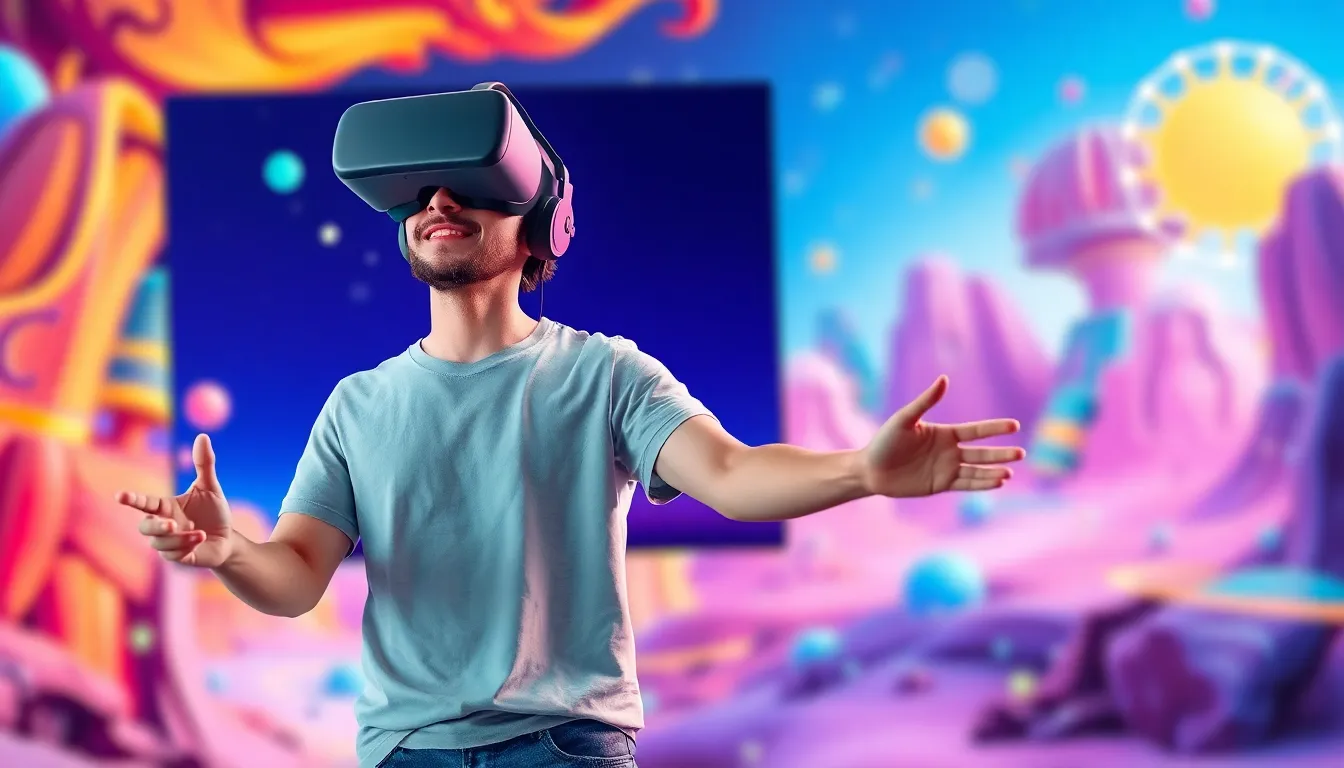In a world where time is money and creativity is king, AI content creation is the shiny new knight in digital armor. Imagine having a tireless assistant that churns out engaging articles, catchy social media posts, and even quirky memes while you sip your coffee. Sounds like magic, right? Well, it’s not; it’s just AI flexing its creative muscles.
With the power of artificial intelligence, content creation has never been easier or more efficient. Gone are the days of staring at a blank screen, desperately waiting for inspiration to strike. Instead, AI tools can generate ideas, optimize SEO, and even tailor content to specific audiences. So, why not embrace this technological wizardry and watch your content soar? After all, who wouldn’t want a little extra help in the ever-evolving digital landscape?
Table of Contents
ToggleOverview of AI Content Creation
AI content creation transforms how individuals and businesses generate written material. It serves as a tool that enhances efficiency in producing articles, blog posts, and social media content. Writers benefit from AI by alleviating common challenges like writer’s block.
Engaging content creation becomes more manageable when using AI-driven software, which can generate topics, suggest headlines, and even produce drafts. AI analyzes existing content trends to identify popular themes and keywords, assisting creators in enhancing their SEO strategies.
Customizing content for specific audiences is another significant advantage of AI. Algorithms can analyze demographic data to tailor messages that resonate with target groups. Analytics tools track user engagement, providing insights that inform future content strategies.
Businesses increasingly adopt AI tools to improve their content quality and reach. According to recent studies, 58% of marketers leverage AI technologies for content generation. Notably, 70% of professionals report improved productivity when incorporating AI into their workflows.
Ultimately, AI content creation is an indispensable resource in today’s digital landscape. It’s poised to redefine traditional writing processes, allowing for accelerated production without sacrificing quality. As technology advances, the relationship between humans and AI in content creation will continue to evolve, presenting exciting possibilities for the future of communication.
Benefits of AI Content Creation

AI content creation offers significant advantages, enhancing both productivity and affordability for content creators.
Increased Efficiency
AI technology streamlines content production, allowing creators to generate articles, social media posts, and more in a fraction of the time traditionally required. By automating repetitive tasks, AI software assists marketers in rapidly developing ideas and outlines. Content drafts can quickly come together, freeing up time for creators to focus on refining their messaging and strategies. With 70% of professionals reporting enhanced productivity, it’s evident that AI significantly contributes to faster completion of content projects.
Cost-Effectiveness
Implementing AI tools proves to be a financially savvy choice for many organizations. Businesses save on resources and time, reducing the need for extensive content teams. Current data shows that 58% of marketers integrate AI technologies for smoother operations, translating into lower operational costs. AI enables smaller teams to tackle larger workloads without sacrificing quality, making high-quality content more accessible. Overall, utilizing AI for content creation maximizes budget efficiency while maintaining high standards across content types.
Challenges of AI Content Creation
AI content creation introduces several challenges that content creators must navigate to maximize its potential.
Quality Control
Ensuring high-quality output poses a significant challenge. AI-generated content often requires human oversight to maintain accuracy and relevance. Content creators need to review generated material for coherence and tone. Errors in grammar or factual information may arise, making it crucial to implement a thorough editing process. In fact, maintaining a brand’s voice through AI articulation can present difficulties. The content might lack the nuance and creativity inherent in human-written material. Striving for quality control remains essential for organizations relying heavily on AI to meet their content needs.
Ethical Considerations
Ethics play a critical role in AI content creation. Using AI can inadvertently lead to plagiarism concerns if the content closely mimics existing works. Marketers must recognize the importance of originality in their messaging. Transparency regarding AI’s role can also affect audience trust, given that consumers often value authenticity. Misleading the audience about content authorship poses risks, as does the potential for biased information generation. Addressing these implications requires a proactive approach to ethical standards in AI content practices.
Popular Tools for AI Content Creation
AI content creation tools streamline the writing process, helping content creators enhance productivity and quality. Various platforms offer unique features and capabilities, catering to diverse needs.
Tool Comparison
| Tool Name | Primary Function | Pricing Model | User Rating |
|---|---|---|---|
| Jasper | Article generation | Subscription-based | 4.8/5 |
| Copy.ai | Marketing copy generation | Pay-per-use | 4.5/5 |
| Writesonic | Blog post creation | Freemium model | 4.7/5 |
| Grammarly | Editing and proofreading | Subscription-based | 4.9/5 |
| Wordtune | Sentence rewriting and suggestions | Pay-per-use | 4.6/5 |
Several options exist, each specializing in distinct areas like article generation, copywriting, and editing. Marketers prefer tools such as Jasper for its user-friendly interface and efficiency. Content creators often choose Grammarly for its exceptional proofreading capabilities.
Features to Look For
Look for AI tools that offer user-friendly interfaces and customization options. Ensure the presence of comprehensive analytics that track user engagement and performance. Prioritize features like SEO optimization and integration with existing platforms. Assess the ability to generate diverse content, from blogs to social media posts, as versatility enhances value. Finally, consider customer support and training resources, as ongoing assistance can improve overall user experience.
Future of AI Content Creation
Anticipated advancements in AI content creation include more refined algorithms that enhance personalization. New tools aim to better analyze user preferences, allowing for even more tailored content experiences. Increased automation capabilities help streamline workflows, freeing creative professionals to engage in higher-level strategy and audience engagement.
Emerging technologies will likely blur the lines between human-generated and AI-generated content. Enhanced tools might integrate seamlessly with existing platforms, facilitating smoother user experiences. Adoption rates continue to rise, with 58% of marketers currently leveraging AI, indicating a clear trend toward greater utilization.
Future projections show that 70% of professionals will report increased productivity with smarter AI tools. Advanced natural language processing features can improve coherence and style in AI outputs. Key challenges, such as maintaining brand voice and ensuring content quality, will dominate discussions as technology evolves.
Ethical considerations remain paramount, particularly regarding originality and transparency. AI tools must effectively address the risk of plagiarism to cultivate consumer trust. Expect deeper conversations around ethical standards as developers and users navigate these challenges.
AI content creation tools will likely expand in capability, incorporating features like real-time analytics and interaction tracking. User-friendly designs, customization options, and robust customer support will become essential for those evaluating these tools. The tools mentioned, such as Jasper and Grammarly, reflect current best practices in the industry.
These dynamics illustrate a significant shift in content creation, positioning AI as a vital partner in the evolving landscape of digital communication. Enhanced collaboration between AI and human creativity will inevitably redefine the way content is produced and consumed.
AI content creation is reshaping how individuals and businesses approach writing and marketing. By streamlining processes and enhancing productivity, it allows creators to focus on what truly matters—crafting compelling narratives that resonate with audiences.
As the technology evolves, it promises even greater efficiencies and personalization, making it an essential tool in the digital age. However, the importance of maintaining quality and ethical standards cannot be overstated.
Navigating these challenges will be crucial for content creators aiming to leverage AI effectively. Embracing this innovative approach while ensuring authenticity and originality will define success in the future of content creation.





